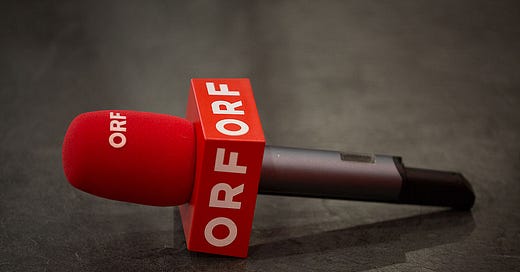Public Broadcasting
Austria's constitutional court has deemed streaming public service broadcasting without paying for it to be unconstitutional
Servus!
The question of how best to fund public service broadcasting was forced upon the Austrian government this week by the country’s constitutional court. Austria’s public broadcaster, the ORF, is currently financed by the GIS, a television license fee that costs between €269.40 and €343.80 per year depending on which state you live in. About two-thirds of the GIS goes directly to the ORF; the other third is divided between the federal government and the states. While federal funds are used to maintain the national broadcasting network and support private broadcasters and the arts, what the states do with their share is up to them.
Any household, workplace, or other institution that owns a device capable of receiving ORF programming like a television or radio is liable for the GIS. More than three million households currently pay it, including those own a television but do not watch the ORF. ‘Capable’ being the operative word here, those who own so-called ‘GIS-free’ televisions—SMART TVs or similar that have neither an antenna terminal nor a built-in tuner—are exempt. Those who do not own a television yet stream ORF programming via the ORF TVThek—its equivalent of the BBC iPlayer—do not have to pay the GIS either.
The current rules have led to a rather absurd state of affairs, then, where Person A can stream ORF shows for free in real time all day long on their laptop or phone in their home and not pay the GIS, while Person B might own a television and not watch the ORF but would have to shell out almost €350 a year for the privilege. This imbalance won’t persist for much longer. On Monday, Austria’s constitutional court ruled that GIS-free streaming of ORF programming was unconstitutional. By the end of 2023, lawmakers will need to conceive of a new model for ORF funding that closes this loophole.
The government has a number of options here. One would be to expand the remit of the existing GIS to encompass all households or institutions regardless of whether they own a television or not, though the need to enforce that change would likely beget further waste and inefficiency. The ORF could also turn its TVThek into a streaming service for which consumers are charged a monthly fee à la Netflix, a move which may have the unintended effect of reducing the public broadcaster’s reach, something antithetical to its mission. Private streaming services, in any case, are facing their own problems vis-à-vis profitability and customer retention.
Another approach would be to abolish the GIS and replace it with a new household levy. The British House of Lords’s cross-party communications and digital committee has suggested something similar, replacing the license fee which funds the BBC with a new levy on council tax bills. The BBC faces a similar problem to the ORF, with people turning away from conventional television and radio broadcasting to streaming via the iPlayer and BBC Sounds. “Under the proposal, all households would pay for the BBC through their local authority bill, with low-earning families paying less for the broadcaster’s services,” The Guardian reported, ending “the traditional link to owning a television set and ensur[ing] that people who only use the BBC’s online or radio services also have to pay to use them.”
Austria’s opposition NEOS party favors a household levy not only because it would close the streaming loophole identified by the constitutional court, but also because it would spread the cost of funding public broadcasting across the population, thus reducing the levy’s sticker price. For much the same reasons, the governing Green Party also supports a new household levy and hopes their coalition partner, the People’s Party (ÖVP), will meet them. Especially in a small country like Austria with a concentrated private media landscape, public service broadcasting is a public good. The ORF just needs a funding model which not only enables it to retain its journalistic independence but also, as the Greens’ Eva Bliminger says, reflects how people consume its services in the twenty-first century.
Bis bald!
Thank you for subscribing to the Vienna Briefing. If you know someone who might be interested in reading this newsletter, consider sharing it with them today.
The Vienna Briefing is a free newsletter. If you would like to support my work, you can send me a tip via PayPal.
Climate Emergency
Lake Neusiedl’s water levels have fallen to their lowest since records began in 1965. The lake, which straddles the border between Austria and Hungary, currently stands at 115.04 meters above sea level.
Jewish Life
Graz will be the home for Austria’s first Jewish community center, the city’s Jewish community has announced. The JCC, due to open its doors in early 2024, will be funded by local and state government respectively.
VBD II
Alexander Van der Bellen is on course to easily win re-election in this fall’s presidential contest. A new poll conducted by OGM shows the incumbent may win 63 percent of the vote, with the far-right Freedom Party (FPÖ)’s candidate Walter Rosenkranz coming in second.






